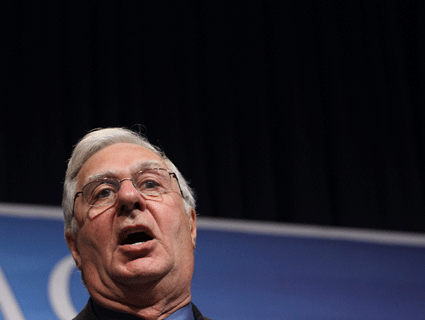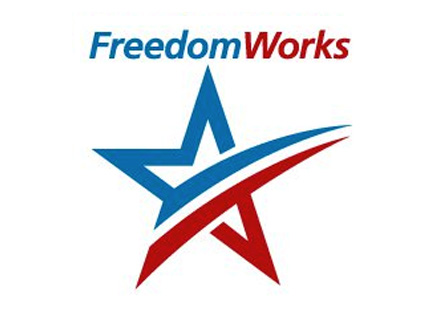
Dick Armey UPPA/ZUMAPress
It was a simple two-page memo—a proposed contract—that ignited the ongoing civil war that threatens FreedomWorks, the prominent conservative outfit that has bolstered and helped shape the tea party movement.
Last August, former Republican Rep. Dick Armey, then the chairman of FreedomWorks, was in Jackson Hole, Wyoming, for a “Restore Liberty” retreat for the group’s donors. According to Armey, he had arrived ready to confront Matt Kibbe, the president and CEO of FreedomWorks, over an issue of much concern to Armey: Kibbe had been poaching Armey’s media interviews. The former House majority leader had come to believe that when the media staff at FreedomWorks was contacted by television and radio producers seeking to book Armey they had replied that Armey was unavailable and instead offered Kibbe as a guest. Armey was upset, but his intention, he says, was to privately raise this matter with Kibbe. A fierce election was under way, and he didn’t want to create too big of a fuss and distract FreedomWorks, which was supporting conservative candidates in hotly contested races.
Yet in Wyoming, according to Armey and other sources connected to FreedomWorks, another issue arose. A FreedomWorks staffer passed to Armey a two-page memo that Kibbe wanted Armey to sign. This proposed agreement—of which Mother Jones obtained a copy—caused Armey to suspect something was amiss at the organization. It began:
The purpose of this Agreement is to memorialize the pre-existing understandings between the Board of Directors of FreedomWorks and Mr. Kibbe regarding the creation and publication of a book written by Mr. Kibbe during his tenure as President of FreedomWorks, titled, Hostile Takeover.
Kibbe had published Hostile Takeover two months earlier. Armey, who in 2010 had co-written with Kibbe a best-selling book, Give Us Liberty: A Tea Party Manifesto, had assumed that Hostile Takeover had been produced the same way as the one he and Kibbe had crafted. While writing Give Us Liberty, Armey and Kibbe had used the resources of FreedomWorks—staffers on the nonprofit group’s payroll, for instance, had conducted research and drafted different chapters—and FreedomWorks had received all the proceeds.
The two-page memo that Armey read maintained that Kibbe was the “sole author and copyright owner” of the more recent work and that “no significant FreedomWorks resources were used in the writing of the book.” It stated that FreedomWorks acknowledged Kibbe had written Hostile Takeover and had done so “not within the scope of Mr. Kibbe’s duties as President of FreedomWorks.” In essence, Kibbe was asking Armey to certify that Kibbe was justified to claim full and sole ownership of the copyright and to pocket all the money from the book deal.
As Armey read the document, he saw serious problems. There had been no pre-existing understanding between him and Kibbe to “memorialize,” he told me—so the fundamental premise of the document appeared groundless. “Why was he asking me to memorialize an agreement about a subject he never discussed with me?” Armey says. Moreover, he says, until this point he’d had no idea that Kibbe was privately profiting from the book. It had been Armey’s impression that Kibbe had utilized FreedomWorks staff for the book. In fact, Armey notes, when he once requested the assistance of a FreedomWorks staffer, he had been told told that person was busy with work on the book. When Armey had read Hostile Takeover, he believed he could even identify which FreedomWorks experts had worked on specific sections.
Yet now Kibbe was stating he wrote the book mostly by himself “on his own time” and that those FreedomWorks employees who helped him research and edit it had also “used their own time.” Armey was convinced that was not so. (Another former FreedomWorks official says that Kibbe did use on-the-clock FreedomWorks employees to produce and promote the book, distracting them from other duties: “He was commandeering staff to help him write this book.”)
Kibbe, who didn’t respond to a list of specific questions submitted by Mother Jones to him and FreedomWorks, told Politico last month, “I wrote this book and it is my property,” and he maintained that he wrote all of it “on my Christmas vacation” in 2011. A FreedomWorks spokesperson also didn’t respond.
Armey didn’t sign the memo. “If I signed, I’d be guilty of misleading the trustees and the board and be in possible legal jeopardy,” he says. Instead, he showed the document to several lawyers, and he concluded that Kibbe’s book deal could be a threat to the organization. As a nonprofit, he says, FreedomWorks cannot be used to provide a private benefit to one of its officials; doing so could threaten its nonprofit tax status. “If they lose their tax-free status, you put them out of business,” Armey says. “Kibbe put the whole operation in jeopardy only to line his own pocket.” Armey feared that the Obama administration could sic the Justice Department or the Internal Revenue Service on FreedomWorks for possible tax violations. “I was frightened for the future of the organization,” he recalls.
With the proposed agreement, Armey says, “Kibbe was trying to get someone to sign a CYA [cover your ass] memo so he wouldn’t end up shooting himself in the foot. But he basically created a smoking gun.”
Armey showed the memo to two members of the group’s board of trustees, C. Boyden Gray, the White House counsel for President George H.W. Bush, and James Burnley IV, a secretary of transportation in the Reagan administration. In early September they removed Kibbe from the board of trustees and suspended him and Adam Brandon, executive vice president of FreedomWorks. “They found other concerns unrelated to the book,” Armey says.
Armey and another former FreedomWorks official also note that the group purchased thousands of copies of Kibbe’s book through retail outlets in an attempt to place it on the bestseller list. “They used contributors’ money to a nonprofit to do this and it helped Kibbe to make money,” Armey says. “This is why Kibbe doesn’t want anybody to look at it.” A former FreedomWorks official notes, “They were using donor money to help [Kibbe] profit, and that’s a huge problem given our nonprofit tax status.”
After being suspended, Kibbe held secret meetings with FreedomWorks staffers in his house and developed plans for his restoration while Armey was running the group, according to a former FreedomWorks official. “You had a choice,” this source remarks. “You could go to Matt Kibbe’s secret meeting and stonewall the trustees, or you could do your job and pray and be faithful to the institution.” FreedomWorks staffers who would not participate in these secret sessions feared retaliation if Kibbe regained the reins, this former official says.
But after days of chaos and uncertainty at FreedomWorks—which included Armey showing up at the offices at one point with an armed security professional—Kibbe was reinstalled, and Armey was out, with an $8 million buyout, courtesy of Richard Stephenson, an influential member of the board of directors with a close connection to Kibbe. (During the 2012 election, Stephenson arranged for $12 million in secretive donations to FreedomWorks’ super-PAC.)
Yet the battle was not over. Last month, Gray and Burnley sent Kibbe a letter informing him that they had retained two outside lawyers to investigate alleged wrongdoing at FreedomWorks. Neither would comment on the investigation, but former FreedomWorks officials say the probe will cover Kibbe’s book deal among other matters. After receiving that letter, Kibbe drafted a memo accusing Armey, Gray, and Burnley of trying to mount a “hostile takeover” of FreedomWorks.
There’s no word on when the internal investigation of FreedomWorks will be over—or whether the results will be publicly disclosed. But all of the turmoil cannot be good for an outfit that raised $41 million last year and yet only achieved limited results in the election. “A lot of the senior staff are looking for new jobs,” an ex-FreedomWorks official says. “Twenty percent are looking to get out.”
Read the proposed contract:









